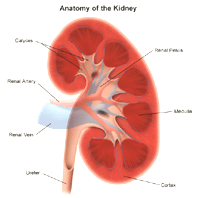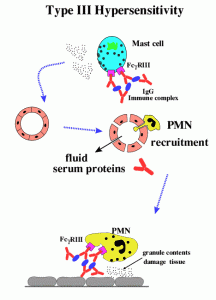Goodpasture’s Syndrome is a rare illness that affects both the lungs and the kidneys and is also known as anti-glomerular basement antibody disease. It is classified as an autoimmune disease, a condition of the body where the defense system responds against some other part of the body, treating it as a threat. The body produces antibodies to fight against the germs when the immune system works normally. But in this condition, the antigens act against the kidneys and lungs. It is not fully understood as to why such a case occurs. Various researchers have recognized several causes, among them are the existence of an inherited component and the influence of particular chemicals which include weed killers such as Paraquat and hydrocarbon solvents, and certain viral infections such as influenza.
As an autoimmune disease, many believe it to be a type II hypersensitivity response to the antigens of Goodpasture on the basement membrane of glomerulus of the kidney and pulmonary alveolus, particularly in the alpha-3 chain non-collagenous domain of the Type IV collagen. The immune system of the body mistakenly identifies these as foreign and then creates antibodies against it which activates an immune reaction.
Symptoms of Goodpasture Syndrome
Goodpasture’s syndrome cause infected individuals to cough out blood or feel a burning sensation when they are urinating. These are symptoms of the disease in more advanced stages, but the signs during its primary phase are quite vague like paleness, difficulty in breathing, nausea and fatigue. These are then followed by various laboratory and clinical findings such as the presence of protein in the urine and blood in the urine. Most of the symptoms do not occur at the same time as they gradually occur over months or even years although in some cases they quickly develop within days or weeks. Other symptoms include:
Dry cough; bloody sputum
shortness of breath after physical activity
Pale skin
hypertension or high blood pressure
bloody urine
swelling in any part of the body (edema)
Diagnosis of Goodpasture Syndrome
Because of the vagueness and rapid development of the symptoms of Goodpasture’s syndrome, diagnosis is oftentimes not attained not until the last phase of the disease is already attained. One of the fastest ways to diagnose the disease is by kidney biopsy wherein doctors will be able to get accurate information and the likely effect and extent of the treatment needed. Tests for antibodies may also be used in combination with other tests.
Physical examination is also conducted where it reveals signs of fluid overload and high blood pressure. Health care providers may hear something abnormal with the heartbeat and sounds from the lungs while listening through the stethoscope. Urinalysis is also conducted since Goodpasture’s syndrome also affects the kidneys. The results should show something abnormal such as the presence of blood within the urine and presence of protein within the urine as well. Unnatural red blood cells may be seen as well. Other tests that may be conducted are:
Arterial blood gas
Chest x-rays
Anti-glomerular basement membrane test
Creatinine
BUN
Kidney Biopsy
Lung Biopsy
Treatment of Goodpasture Disease
The main objective of the treatment to be conducted for Good pasture’s syndrome is to remove the antibodies present within the blood. Plasmapheresis is a kind of treatment that removes the blood from the body and exchanges it with fluid, donated plasma and protein. Furthermore, there are some drugs that are used to restrain the immune system of the body such as corticosteroids. Managing the blood pressure also needs to be done and is also the most important treatment in order to delay the damage done to the kidneys. For this, certain medicines are prescribed in order to control hypertension. These include ARB or angiotensin receptor blockers and angiotensin-convertin enzyme.
Preventing Goodpasture’s Syndrome
Natural ways for prevention is by lessening the fluid and salt in order to manage the swelling. A low or moderate protein diet is sometimes recommended in particular cases. Dialysis is conducted for severe kidney failure. Sometimes kidney transplant maybe needed when the situation calls for it such as a permanent kidney function loss. Transplant process is not conducted until the amounts of antibodies have dropped.
Complications of Goodpasture’s Syndrome
Individuals may suffer complications such as:
lung failure
severe pulmonary hemorrhage
rapidly progressive glomerulonephritis
end-stage kidney disease – complete failure of the kidneys conserves electrolytes, concentrate urine and excrete wastes.
chronic kidney disease – a slow and progressive loss of ability of kidneys to conserve electrolytes, concentrate urine and excrete wastes.
In order to prevent Goodpasture’s syndrome from developing within the body or helping it progress, never sniff a siphon gasoline or glue via the mouth because the lungs will be exposed to the hydrocarbon solvents which can trigger the disease.


